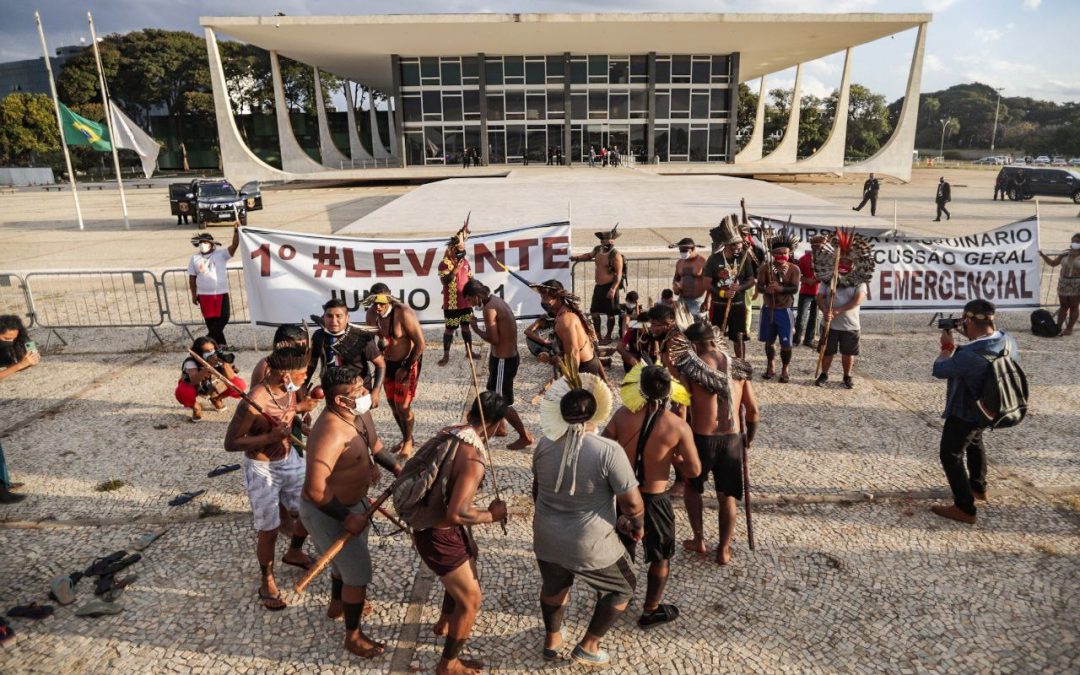
07/Jul/2021
This bill could cancel the indigenous lands demarcation and represent a new genocide to the originating peoples.
The Articulation of Indigenous People From Brazil (Apib) forwarded, this Tuesday (6), to the United Nations (UN) an “urgent appeal” for taking action to stop the processing of the law project 490 bill in the National Congress. The appeal was made together with the Coordination of the Brazilian Amazon ‘s Indigenous Organization (Coiab), Arns Commission, Social-Environmental Institute and Human Rights Conectas
The bill’s text was approved, last week, in the Commission of Constitution and the Justice of Brazilian’s Congress and, according to the entities, cancels the indigenous lands demarcation, threatens the existing territories and takes constitutional rights away.
“We present the information in this urgent appeal to the special procedures of the United Nations and the Special Rapporteur of the CIDH to request the investigation and demand immediate measures by the Brazilian authorities about the legally iresponsable procedures, in particular the Substitute Bill nº 490/2007, in the Brazilian’s Congress, which will violate the indigenous rights in the country, invalidating indigenous lands demarcations, threatening the certified territories and destroying, constitutional rights, and are also incompatible with the international obligations assumed by Brazil in human rights.” highlighted exert of the appeal sent.”
Access the complete file here: Urgent Appeal_Brazil Draft Bill 490
Besides the 490 bill, the document sent to the UN requires all projects of law with similar consequences to be subjected to a wide and detailed democratic debate.
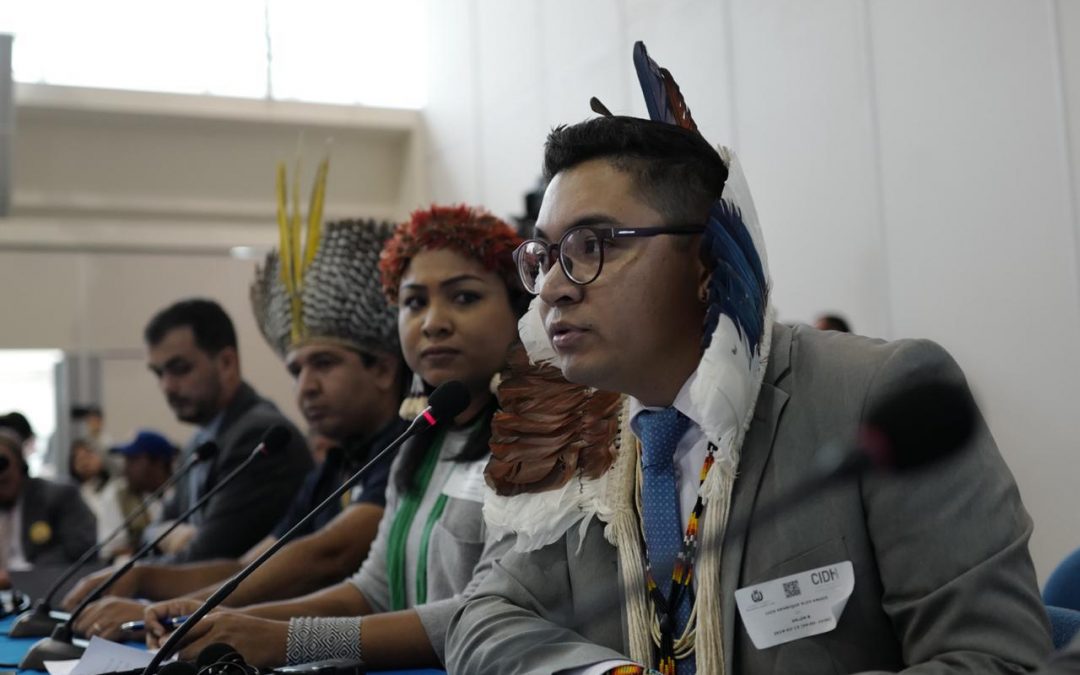
01/Jul/2021
The violence escalation into indigenous territories during Covid-19 pandemic will be on the center of the complaints.
This Thursday, July 1st, the Inter-American Commission on Human Rights (IACHR) receives complaints from indigenous organizations and leaders representing the Munduruku, Yanomami and Guajajara peoples, about the worsening of violence in their territories during the period of Covid-19 pandemic. The action is part of the 180th Session of the Commission and meets the request of the Articulation of Indigenous Peoples of Brazil (Apib) in conjunction with the Coordination of Indigenous Peoples of the Brazilian Amazon (COIAB), Association of Munduruku Wakoborũn Women and Hutukara Association, in addition to other partners.
“The escalation of violence foreshadows even more tragic results, and that is why it is essential this Commission takes all appropriate measures.”, highlights an excerpt from the communiqué sent to the IACHR to request the hearing that takes place today (1). Access the document presented to the IACHR here.
On June 18, Brazilian Constitutional Court unanimously determined the protection of the Munduruku and Yanomami peoples to prevent further massacres in the territories. The court ruled on the request made by the Articulation of Indigenous Peoples of Brazil (Apib) for the urgent removal of invaders, especially from Indigenous Lands (TIs) Munduruku, in Pará, and Yanomami, in Roraima, and to guaranteeing the physical integrity of the threatened people in these locations.
Invasions into indigenous territories increased during the covid-19 pandemic, and are aggravating violence against communities and leaders, causing outbreaks of diseases such as malaria, in addition to the new coronavirus, and intensifying environmental degradation. Apib’s request to the STF for the protection of the territories was made within the scope of 709 Action for Non-Compliance with Fundamental Precept (ADPF). Access the full request here.
Session
The hearing with the IACHR to denounce the violence committed against indigenous peoples is scheduled to start at 12:00 pm (Brasilia time) and will be broadcast online on the commission’s social networks. During the 180th Session of the commission, several complaints will be made about violations of rights committed in Brazil during the period of the Covid-19 pandemic.
The hearing that highlights the context of indigenous peoples counts on the participation of the legal coordinator of Apib, Eloy Terena, the vice president of the Federation of Indigenous Peoples of Pará (Fepipa), Alessandra Munduruku, the vice president of the Hutukara association, Dario Yanomami, the coordinator of the Association Wakoborũn Leusa Munduruku and indigenous leader Julius Ye’kwana.
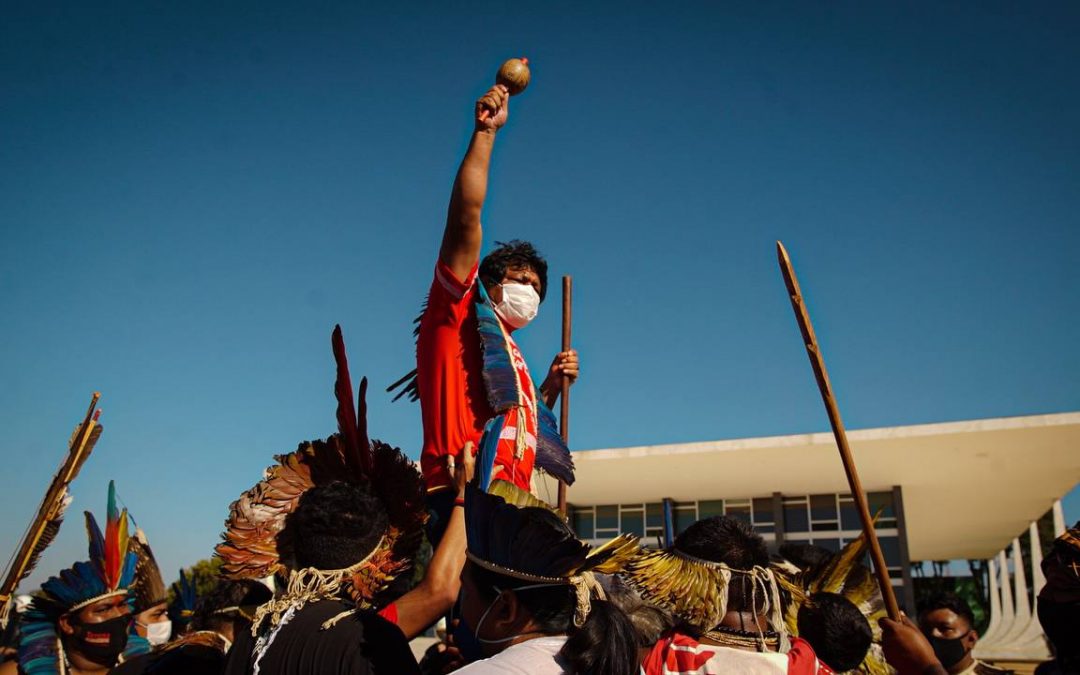
30/Jun/2021
A case that could seal the future of indigenous peoples returns to the Supreme Court’s voting agenda in August, when the international recognition of indigenous peoples is celebrated
Brasília, June 30, 2021 – Brazil’s Federal Supreme Court (STF)’s ended its session today without ruling the case on the demarcation of indigenous lands. The Chief Justice, Luiz Fux, stated that the case will return to the Court’s agenda in August 25th, after the July recess (from 2 to 31).
Camped for weeks in Brasília and in other territories across the country, the indigenous people expected the Court to analyze the repossession lawsuit filed by the government of Santa Catarina against the Xokleng people, concerning the Ibirama-Laklãnõ Indigenous Territory, where the Guarani and Kaingang peoples also live. With the status of “general repercussion,” the ruling will serve as a guideline for the federal government and all instances of Justice, as well as a reference to all proceedings, administrative procedures and legislative bills in regard to demarcation procedures.
“Sadly, the general repercussion was not ruled, but we will keep up our fight, as always, for the demarcation of our lands and in defense of the environment. The Supreme Court has pledged to schedule the trial for August, and we will continue our mobilization. The shows disregard to indigenous rights, and we do not have it,” warns Brasílio Priprá, leader of the Xokleng people.
The postponement of the decision reinforces the urgency of the struggle waged by the indigenous peoples. “We have to keep resisting. We must keep up our fight with the same energy. August has to be the month of our struggle!,” said Kretã Kaingang, executive coordinator of the Association of Indigenous Peoples of Brazil (Apib) and one of the organizers of the Rise for Earth Camp, which has gathered more than 850 indigenous people from 50 nations in the Brazil’s capital since June 8.
The month of August is marked by the international recognition of indigenous peoples and, according to Sonia Guajajara, Apib’s executive coordinator, the fight for rights continues across the country, until the new date of the trial. “We are here today once again call all for the ‘Indigenous August’. We will return to Brasília in August to fight against all these setbacks, against all these anti-indigenous measures that are being processed within the three levels of Government.”
Marco Temporal
The Time Limit Trick, know as Marco Temporal in Portuguese, is a pseudo-legal interpretative framework developed by political sectors – such as the agribusiness lobby – which seek to limit Indigenous land rights in order to enable the economic exploitation of Indigenous territories. In blatant opposition to the constitutional norms which enshrine Indigenous territorial rights, the “Temporal Mark” framework postulates that Indigenous peoples are only entitled to the lands they occupied on the date of the promulgation of the Brazilian Federal Constitution – i.e. October 5th, 1988. Alternatively, if they were not physically on the lands, they would need to have been part of a legal dispute or in a material conflict proven by the area on that same date.
In addition to contradicting the Brazilian Constitutional framework – which does not establish any temporal limitations to Indigenous land rights – this hypothesis is unfair, as it disregards expulsions, forced removals and all the violence Indigenous peoples have endured before the Brazilian Constitution was enacted. Furthermore, it ignores the fact that, until 1988, Indigenous groups were under the tutorship of federal government, and lacked the autonomy to file lawsuits in their own name.
The adoption of the as a criterion for a time limit trick demarcation of indigenous lands is also one of the points provided for by Bill 490, a bill that was strongly opposed by the indigenous peoples over the past weeks.
Approved by the Commission of Constitution and Justice (CCJ) of the Chamber of Deputies, Bill 490, which incorporates a series of other attacks on indigenous constitutional rights, can be put on the agenda at any time.
“We didn’t lose heart when the voting was postponed, nor when Bill 490 was approved by the Commission. This is not the first time our rights have been put at risk. We are resistance and we will keep on fighting. Despite all these attacks, we’re chanting and fighting, and that’s how we’re going to win,” guarantees Juma Xipaya, a leader of Middle Xingu, in Pará.
Postponements
The trial was previously scheduled for June 11, but was suspended after Minister Alexandre de Moraes requested the matter to be discussed in a separate, more detailed plenary session only one minute after the trial began. The other ministers didn’t even cast their votes. Nonetheless, the vote of the rapporteur, Minister Edson Fachin, was made public.
The chief justice, Luiz Fux, put the case back on the agenda this Wednesday (30), and is expected to be resumed in August 25th, according to Fux.
Even with no date set for the trial, the indigenous peoples say they will remain mobilized. “We have to continue our resistance. We must keep up our fight with the same energy. August has to be the month of our fight!,” says Kretã Kaingang.
“They (the Supreme Court Justices) have no idea of the suffering of those who live under a tarpaulin on the side of the road, within a land being reclaimed, suffering threats, suffering repossession, with their leaders treated as criminals. The Justices have no idea what it feels like,” emphasized Kretã.
The Ibirama-Laklãnõ Indigenous Land is located between the municipalities of Doutor Pedrinho, Itaiópolis, Vitor Meireles and José Boiteux, 236 km northwest of Florianópolis (SC). The area has a long history of demarcations and disputes, crossing the 20th century, during which it was drastically reduced. It was identified through studies by the National Indian Foundation (FUNAI) in 2001, and declared by the Ministry of Justice as belonging to the Xokleng people in 2003. They have never stopped claiming the right to their ancestral territory.
In the general repercussion proceeding, the Justices will also analyze the ruling of Justice Edson Fachin, of May 2020, which suspends the effects of Opinion 001/2017 of the Attorney General’s Office (AGU). The ruling made official the so-called “temporal framework,” among other issues, which has been used by the federal government in attempts to paralyze and even reverse demarcations.
In that same ruling, Minister Fachin suspended, until the end of the Covid-19 pandemic, all legal proceedings that could result in evictions or in the annulment of demarcation procedures. This decision must also be discussed by the Court.
Learn more on the case that could seal the future of indigenous peoples here
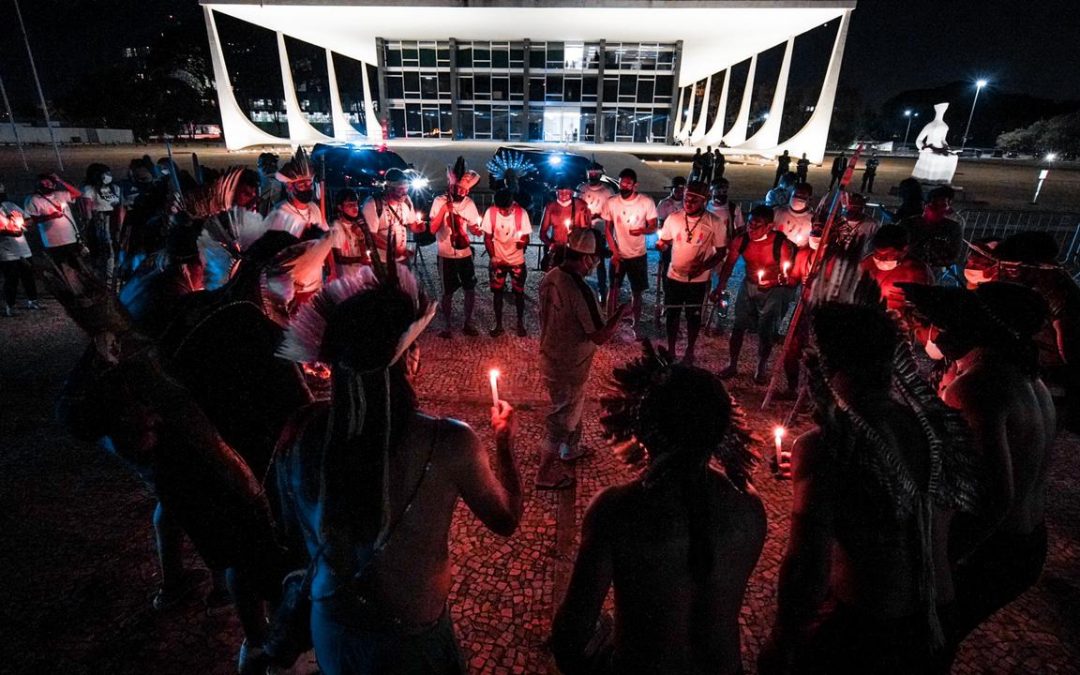
29/Jun/2021
The Supreme Court will consolidate its legal interpretation on the rights of indigenous peoples over their lands. The Time Limit Trick is a pseudo-legal interpretative framework developed by political sectors to limit Indigenous land rights in order to enable the economic exploitation of Indigenous territories.
Brasília Brazil, June 29, 2021 – Tomorrow, June 30, 2021, Brazil’s Supreme Court (STF) begins the trial that will define the future of the Indigenous Land demarcations in Brazil.
The Court will analyze the land repossession lawsuit filed by the state government of Santa Catarina against the Xokleng people, concerning the Ibirama-Laklãnõ Indigenous Land, where the Guarani and Kaingang peoples also live. In 2019, the Supreme Court applied the status of “general repercussion” to the suit, which means that the decision will serve as a guideline for the Brazilian federal government and all instances of Justice regarding demarcation procedures.
The ministers will also analyze the ruling of Minister Edson Fachin, of May 2020, which suspends the effects of Opinion 001/2017 of the Attorney General’s Office (AGU). The Opinion institutionalizes the so-called “Marco Temporal (Time Limit Trick),” among other issues, and has been used by the federal government to paralyze and even reverse the demarcation of Indigenous lands. In that same ruling, Minister Fachin suspended, until the end of the Covid-19 pandemic, all legal proceedings that could result in evictions of Indigenous groups in repossession suits or in the annulment of demarcation procedures. This decision must also be discussed by the court.
The Time Limit Trick is a pseudo-legal interpretative framework developed by political sectors – such as the agribusiness lobby – which seek to limit Indigenous land rights in order to enable the economic exploitation of Indigenous territories. In blatant opposition to the constitutional norms which enshrine Indigenous territorial rights, the “Temporal Mark” framework postulates that Indigenous peoples are only entitled to the lands they occupied on the date of the promulgation of the Brazilian Federal Constitution – i.e. October 5th, 1988.Alternatively, if they were not physically on the lands, they would need to have been part of a legal dispute or in a material conflict proven by the area on that same date.
In addition to contradicting the Brazilian Constitutional framework – which does not establish any temporal limitations to Indigenous land rights – this hypothesis is unfair, as it disregards expulsions, forced removals and all the violence Indigenous peoples have endured before the Brazilian Constitution was enacted. Furthermore, it ignores the fact that, until 1988, Indigenous groups were under the tutorship of federal government, and lacked the autonomy to file lawsuits in their own name.
The trial was previously scheduled for June 11, but was suspended after Minister Alexandre de Moraes requested the matter to be discussed in a separate, more detailed plenary session only one minute after the trial began. The other ministers didn’t even cast their votes. Nonetheless, the vote of the rapporteur, Minister Edson Fachin, was made public.
The trial will be broadcast on TV Justiça, with the presentation and debate on the votes. The trial is not expected to be concluded on that date or even in the special session, already scheduled for the following day,July 1, because ministers can ask to analyze the matter more carefully, taking it under advisement, suspending and postponing the session for an uncertain date.
The Ibirama-Laklãnõ Indigenous Land is located between the municipalities of Doutor Pedrinho, Itaiópolis, Vitor Meireles and José Boiteux, 236 km northwest of Florianópolis (SC). The area has a long history of demarcations and disputes, crossing the 20th century, during which it was drastically reduced. It was identified through studies by the National Indian Foundation (FUNAI) in 2001, and declared by the Ministry of Justice as belonging to the Xokleng people in 2003. They have never stopped claiming the right to their ancestral territory.
What do the participants in the proceeding say?
“The delay in demarcating indigenous lands is very troubling. Because, as time goes by, difficulties for the demarcation of land in Brazil increase. Indigenous peoples need to have their traditional rights acknowledged. And we would like the general repercussion to be ruled in our favor, and that we stop talking about a Time Limit Trick.”
Brasílio Priprá, one of the leaders of the Xokleng
“We expect the Supreme Court adopt a fairer, more reasonable interpretation that can help to enforce our rights. And that it no longer resorts, for example, to the temporal framework principle to limit the recognition of rights to us, indigenous peoples, which has been happening for the last ten years. But the Court can also strengthen our struggle in this confrontation with other powers, which use the Time Limit Trick as a criterion for the restriction of rights.”
Samara Pataxó, attorney for the Association of Indigenous Peoples of Brazil (APIB)
“The way the people lost their territory was the most violent, vilest, the most terrible. At the beginning of the last century, there was demarcation without technical criteria. In the 1920s, a significant part of the territory was lost. In 1950, the same thing happened. Afterwards, the construction of a dam took away the best lands. And in this context, the dispute of the Xokleng people takes place, so that the return of these stolen areas is in fact secured.”
Rafael Modesto, attorney for the Xokleng community and legal advisor to the Indigenous Missionary Council (CIMI).
Rise for the Earth
Indigenous peoples from all regions of the country have mobilized against the Time Limit Trick principle. Since June 8, around 850 leaders from 50 peoples have been mobilized at the Rise for the Earth camp, in Brasília, against the advance of the anti-indigenous agenda by the Bolsonaro government and the rural bench in Congress.
“The camp is a call from the land to all peoples in Brazil, for us to show this genocidal who the true owners of the land are. We are in Brasília to guarantee our original rights and to say ‘stop genocidal Bolsonaro and his Machiavellian projects against the indigenous populations’,” says Kretã Kaingang, APIB’s coordinator.
Indigenous peoples in all territories have been mobilizing for weeks against the “evil package” that is being processed in the National Congress, such as Bill 490/2007, which opens indigenous lands to predatory economic exploitation and makes it impossible, in practice, that new demarcations be made. In the highway obstructions, rituals and prayers, the indigenous peoples also take a stand against the temporal framework principle, which seeks to restrict their constitutional rights.
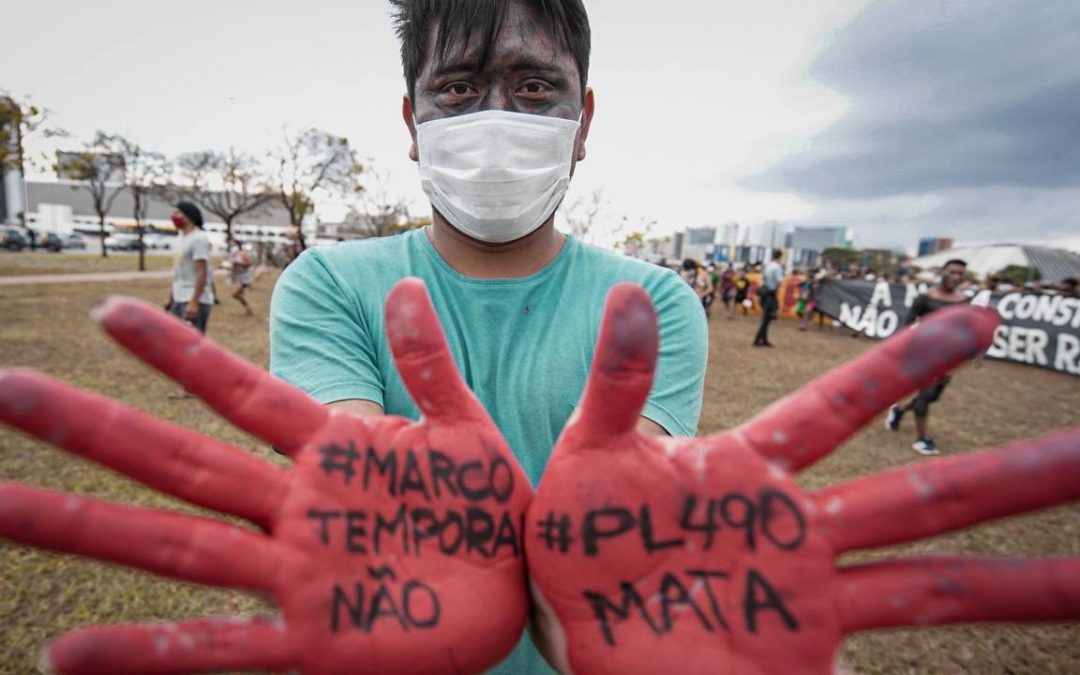
29/Jun/2021
On Monday (28), Apib – Articulation of the Indigenous Peoples of Brazil held an international meeting with non-governmental partner institutions and other stakeholders to discuss the emergency situation in Brazil. Convened the previous Friday, the meeting was attended by over 200 people from 26 countries from all regions of the world. This demonstrates the international interest in the situation experienced by Indigenous Peoples in Brazil, and the relevance of Apib as a global authority on issues involving indigenous peoples and the preservation of the environment.
During the meeting, which lasted about two hours, Apib leaders shared the institution’s view on the threats that are mounting in the National Congress against the territorial rights of indigenous peoples, especially in the context of Bill 490 of 2007. This Bill transfers to the Congress the responsibility of demarcating Indigenous Lands, which submits indigenous peoples to the interests of each legislature composition. Currently, the strong presence of agribusiness and the military would make it practically impossible to advance in the demarcation of territories that have not yet had their process concluded. On the contrary: there is the risk of regression, with the annulment of the approval of Indigenous Lands already consolidated.
Attorney Luiz Eloy Terena, of the Legal Coordination of Apib, also spoke about the trial by the Federal Supreme Court (STF) of the Special Appeal involving the Ibirama-Laklãnõ Indigenous Land, of the Xokleng people in Santa Catarina state. This action, which may be resumed by the STF plenary later this week, debates the thesis of the “temporal milestone” for the demarcation of indigenous lands, which has the status of “general repercussion”, meaning that the decision ruled in the case will guide future judicial decisions, legislative initiatives and even public policies on this issue.
Sônia Guajajara, Executive Coordinator of Apib, mediated the entire meeting directly from the Rise for the Earth Camp, which was established in Brasilia over a month ago and currently brings together about a thousand indigenous people who came from all regions of Brazil, even during the pandemic, to defend their rights. She informed the participants about the intense agenda of mobilizations planned for the coming months.
The Executive Coordinator of Apib, Dinaman Tuxá, also present at the meeting, shared with the international partners a broad vision of the violence and threats experienced by Indigenous Peoples in Brazil, which include constant attempts to invade their lands.
Towards an International Indigenous Mobilisation
Marielle Ramirez, an Apib collaborator, reinforced the importance of the support of international partners to strengthen the struggle of Indigenous Peoples in Brazil. “What we are proposing is more than the participation in a tweet, in a Petition: we propose a permanent articulation, which is constantly aware of the threats we live in Brazil”, said Sônia Guajajara.
Apib already has a strengthened network of partners around the world, and hopes to reinforce this network with the International Indigenous Mobilization through a series of meetings and political alignments that will intensify in July, such as dialogue with UN institutions, with Embassies and Diplomatic Representations in Brazil, among others.
If you or your institution wish to be part of this Mobilization and receive more information about Apib’s actions, please register by clicking here.
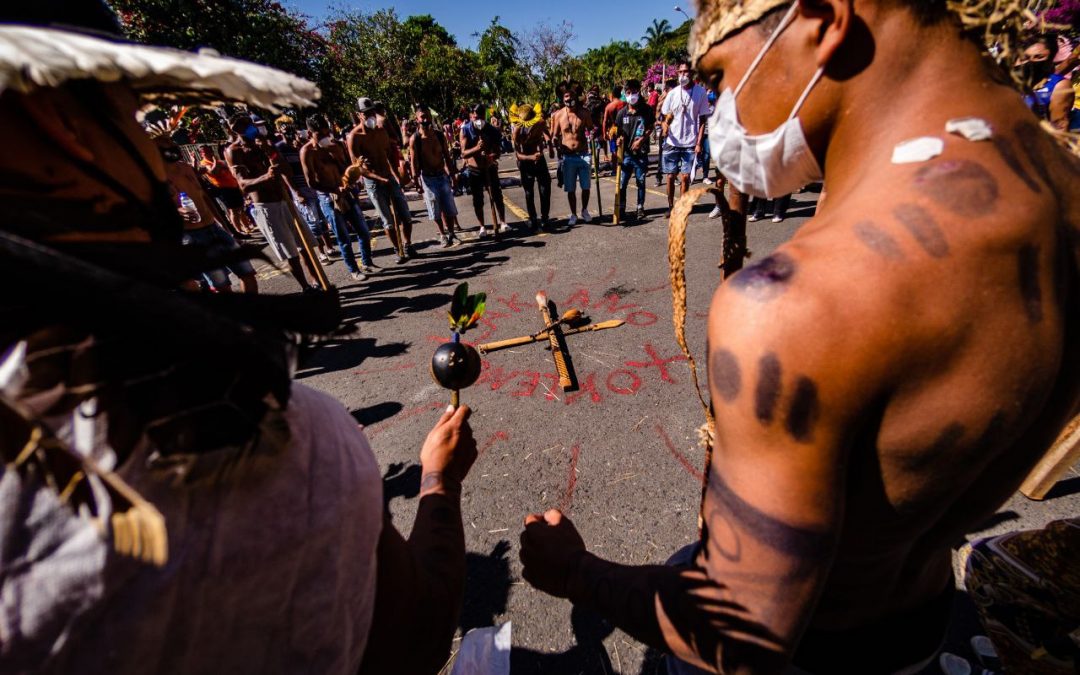
23/Jun/2021
Presidents of the Chamber of Deputies and of the Commission of Constitution and Justice maneuver to approve bill that allows the annulment of Indigenous Territories and makes demarcations unfeasible
Under the leadership of ruralists and Bolsonaro’s allies, the Chamber’s Commission of Constitution and Justice (CCJ) approved, by 40 votes to 21, the Bill (PL) 490/2007. The voting ended this afternoon, June 23, after a battle of requests and procedural issues posed by opposition members, who tried to withdraw the bill from the agenda throughout the day. This Thursday, the commission analyzes eight of deputy Arthur Maia’s provisions on the bill, after which the legislation goes to a plenary vote, at an undermined date. The indigenous movement remains mobilized against the anti-indigenous agenda in Congress.
The president of the Chamber, Arthur Lira (PP-AL), and the president of the Commission, Bia Kicis (PSL-DF), maneuvered to delay the beginning of the main plenary session, allowing the committee meeting to be extended, and the bill to be approved. Since mid-morning, Kicis rejected, one by one, the numerous claims, requests for a public hearing and calls for dialogue with the Indigenous movement, which for weeks has been demanding to be heard regarding the proposal, as determined both by the Constitution and Convention 169 of the International Labor Organization (ILO).
The PL 490 is a top priority for Jair Bolsonaro and for the ruralist caucus that claims to represent agribusiness. The bill will make demarcations unfeasible, allow the annulment of Indigenous Territories and pry them open to predatory projects, such as mining, roads and major hydroelectric plants. The bill is unconstitutional, as assessed by members of the Indigenous movement and legal experts.
Kicis suspended the commission’s meeting scheduled for yesterday, after a peaceful protest by Indigenous people against PL 490 turned violent as police outside the Chamber approached in riot gear. In an act considered unusual and authoritative, she established the proposal as the only item on today’s agenda.
Police violence left three Indigenous people injured and another ten had sustained minor injuries from the confrontation. The demonstrators were protesting peacefully in the parking lot of Annex 2 of the Chamber, when they were violently attacked by the Military Police, with rubber bullets and tear gas. Children and elderly people were among the protesters.
In a statement, 170 organizations (Indigenous and allies in the resistance of the original peoples) expressed their repudiation regarding the repression carried out against the demonstrators in Brasília. “The Indigenous people who left their communities, at a time when the pandemic is still raging in the country, to take their indignation to the streets against the violent advance of various sectors on their territories are those willing to help society build a new path,” says an excerpt of the release. Read the full document here.
“What we want is for the law to be enforced, for the Federal Constitution to be upheld. This bill can nullify the demarcation of Indigenous lands in the country – it is an aggression against the original peoples,” said Dinamam Tuxá, Executive Coordinator of the Association of Indigenous Peoples of Brazil (APIB).
The demonstration is part of the Rise for Earth Camp (Acampamento Levante da Terra), which has been set up next to the National Theater, in Brasília, for the past three weeks, to protest against the anti-Indigenous agenda of the government and Congress, as well as in defense of favorable decisions at the Federal Supreme Court (STF). Approximately 850 Indigenous people from 48 different peoples from all regions of Brazil, are gathered in the Camp. They are all vaccinated and following sanitary protocols (physical distancing, use of masks and constant hand hygiene).
Unconstitutionality
“Our Constitution cannot be changed by any selfish, personal interest from those who look greedily toward Indigenous Territories. This is the look we see on all the speeches that want to get PL 490 approved. Pure greed for the natural resources of the Indigenous lands, which are guaranteed by the Federal Constitution,” criticized Deputy Joenia Wapichana (Rede-RR).
According to the parliamentarian, the legislative procedure in the Commission was flawed, precisely because it failed to recognize that the matter is unconstitutional. Deputy Wapichana recalled that any regulation of Article 231 of the Constitution, which provides for Indigenous rights, should be done through a Supplementary Law Bill, and not through an Ordinary Law Project, as is the case with PL 490.
Several opposition parliamentarians recalled that the Federal Supreme Court should rule on several of the points provided for in PL 490, such as the “Temporal Mark”. This is a thesis by the ruralist caucus, which claims that Indigenous communities would only have the right to the lands that were in their possession as of October 5, 1988, the date on which the Constitution was enacted.
“They try to rush this matter into a bill so that there could be a competition with the Supreme Court. This is absurd,” Wapichana stressed.
Prejudice and discrimination against Indigenous People
Yesterday and today, government deputies made speeches that can be considered prejudiced and discriminatory against the protesters of this bill and Indigenous peoples in general. Deputy Alê Silva (PSL-MG) even compared Indigenous reserves to “human zoos” and accused the demonstrators outside the Congress of “troublemakers” and referred to them as “dumb.”
Yesterday, Arthur Lira accused Indigenous people of using drugs on the roof of the parliament. “Last week, some representatives of the Indians arrived here, invaded the National Congress, climbed to the top of the domes and sat there using some kind of drug,” he said, with no any proof whatsoever.
Joênia Wapichana also announced that she will file a complaint to the Ethics Council against another leader of Bolsonaro’s shock troop, Carla Zambelli (PSL-SP). According to Wapishana, when she met Zambelli in the Chamber’s corridors, she stated that “your Indians are murderers” and that Joênia would not represent the Indigenous People in the Chamber.
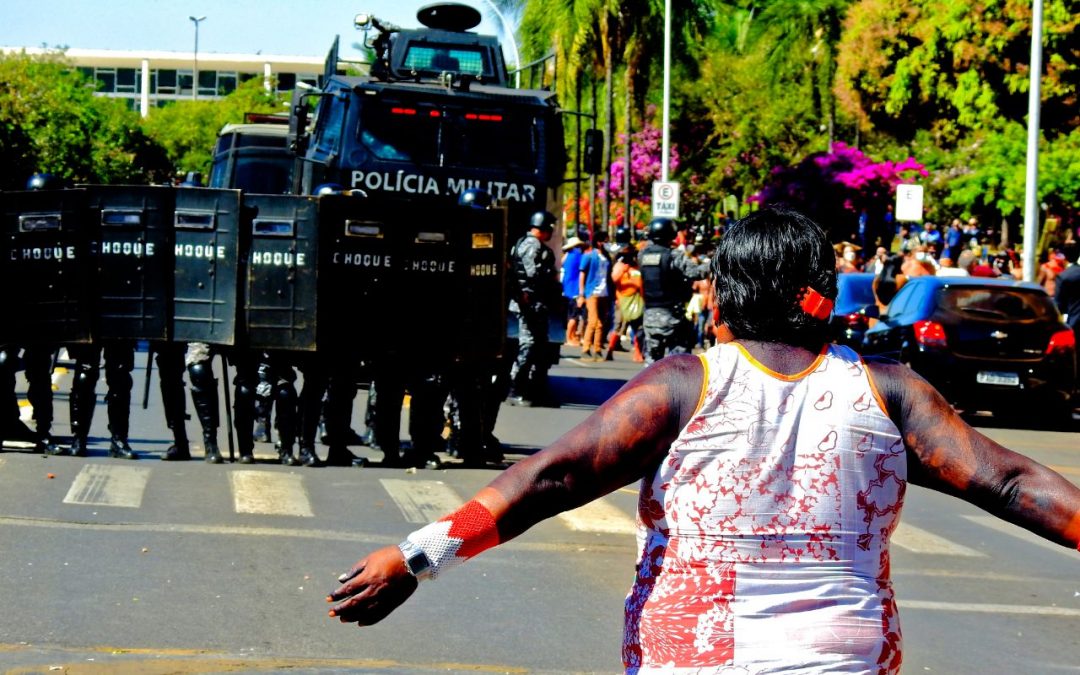
23/Jun/2021
Note from the Articulation of Indigenous Peoples of Brazil
Brasilia June 23, 2021
We struggle with our prayers and chants. Our shields are the maracas and our ancestry. The Government welcomes the agrobusiness through the front door and the indigenous people with gas bombs, pepper spray, rubber bullets, riot police and hate!
In the midst of the Covid-19 pandemic, we decided to mobilize the Rise for Earth camp, in Brasília, and prevent the advance of the Federal Government’s anti-indigenous agenda. For the first time in history, a president of the National Indigenous Foundation (Funai) closes the dialogue and represses the indigenous movement using heavy police force in the federal capital.
We are attentive to Bill 490, which is on the voting agenda of the Chamber’s Constitution and Justice Commission (CCJ). An unconstitutional proposal that could end the demarcation of Indigenous Lands. Since the 8th of June we have been holding demonstrations against the bill vote, in the outskirts of Congress, but yesterday (22) our mobilization was repressed by the police in yet another attempt to silence our voices.
The Federal Constitution of 1988 is being torn down to violate our rights and increase environmental attacks. We decided to fight to the end to ensure not only the future of indigenous peoples, but also the future of humanity.
We know that the attacks will not stop and that we are not privileged to stop fighting. We will continue in the federal capital, swinging our maracas so that the whole world knows the importance of our lives until the last indigenous person.
We have no choice or we die from the virus or we are slaughtered by the Government’s death policy. We cannot suffer so much violence without reacting. We are in this fight for life and that is why we continue to shout: Indigenous blood, not a single drop more!
For the life and historical continuity of our peoples, “Tell the people to move forward”.
Articulation of Indigenous People of Brazil
Apib regional base organizations:
APOINME – Articulation of Indigenous Peoples of the Northeast, Minas Gerais and Espírito Santo
ARPIN SUDESTE – Articulation of Indigenous Peoples of the Southeast
ARPINSUL – Articulation of Indigenous Peoples of the South
ATY GUASU – Great Assembly of the Guarani people
Guarani Yvyrupa Commission
Terena People’s Council
COIAB – Coordination of Indigenous Organizations in the Brazilian Amazon
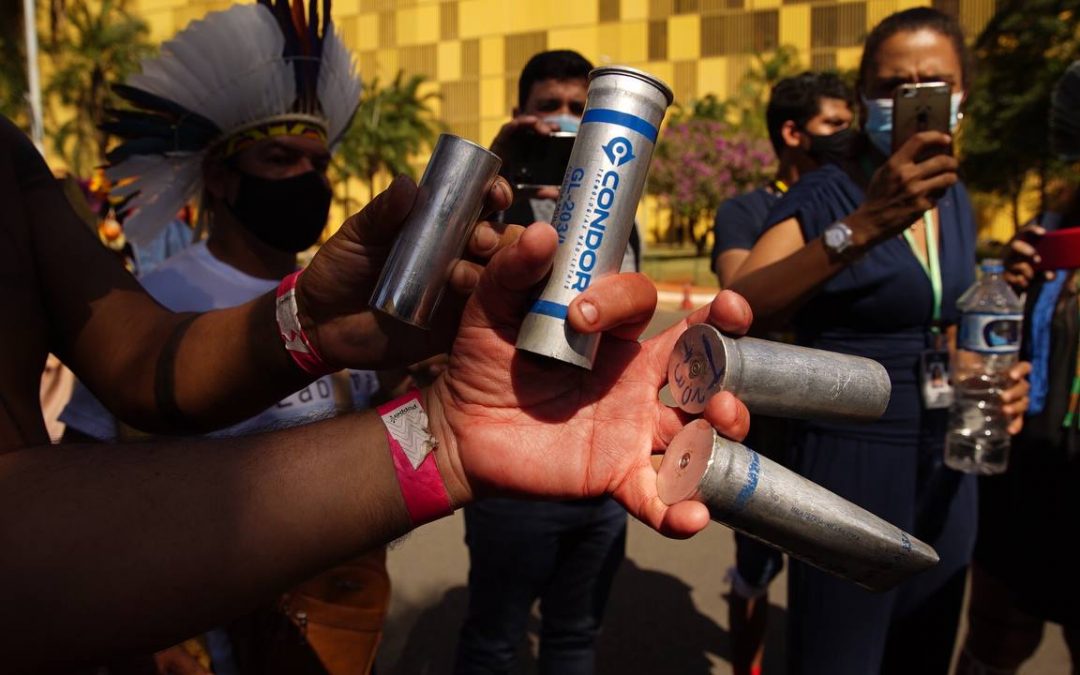
22/Jun/2021
A group of indigenous people, including some children and elderlies, was attacked by the police this afternoon, during a pacific demonstration against the deliberation about Bill 490/2007 by the Brazilian National Assembly. The legal proposition that can nullify the process of demarcating indigenous lands finds itself included in the agenda of the National Assembly Commission for the Constitution and Justice. The attacks took place at the Assembly parking lot, with the use of rubber bullets, stun bombs and tear gas.
Two indigenous people (a man and a woman) are under observation due severe injuries in the “Hospital de Base” in Brasília. Around ten children, elderlies and women had light injuries and needed to be treated by the health care service from the Rise for the Earth camp, organised by Apib – Brazilian Indigenous People Association. The emergencial care for the injured people was made difficult by the police, as can be observed in some videos that record the precise moment of the attack.
The protesters were marching together by the Esplanada dos Ministérios (avenue where the most part of National Ministries are situated), when they were reached by the police, close to the National Assembly entrance. There were no action or incident caused by the indigenous people to justify the violent reaction from the police forces. According to the protesters, there were members of several police forces assembled, with a large number of repression equipment, including one ‘caveirão” (a military tank used by the police during special operations against Brazilian citizens) and a mounted troop.
This indigenous parade is part of the Rise for the Earth Camp, situated close to the National Theater during the last three weeks. Around 850 indigenous people are gathered at this camp – they belong to 48 different peoples from all Brazilian regions. They are moved by the legislative innovations under appreciation by the National Assembly that threaten their rights, mainly territorial ones.
“The relatives just came to protest against the 490 Bill, that will terminate the policy of indigenous land demarcation, and the police arrived already with their bombs. They can gather to retreat our rights, however, when we try to manifest in reaction, we are received with violence”, stated Alessandra Korak Mundukuru. “We are here along with children and elderlies, many people were hurt”, she finishes.
The struggle keeps alive
The session of the Commission for the Constitution and Justice was postponed – it is expected to be resumed tomorrow. During the police attack, some congressmen allied to the indigenous agenda formed a kind of barrier to restrain the troops that kept threatening the indigenous people who performed their rituals and chants. Afterwards, several oppositional congressmen assembled with the protesters. They criticized the police action and promised to denounce it before the National Assembly president, Congressman Arthur Lira.
The 490 Bill is a demand from ruralist and Bolsonarist congressmen, and, if ruled, it will avoid new demarcations, allow the nullification of Indigenous Lands, and deliver those lands to predatory enterprises, such as minery, roads and hydroelectric plants. This is an unconstitutional rule that represents an open door for a new genocide of indigenous peoples.
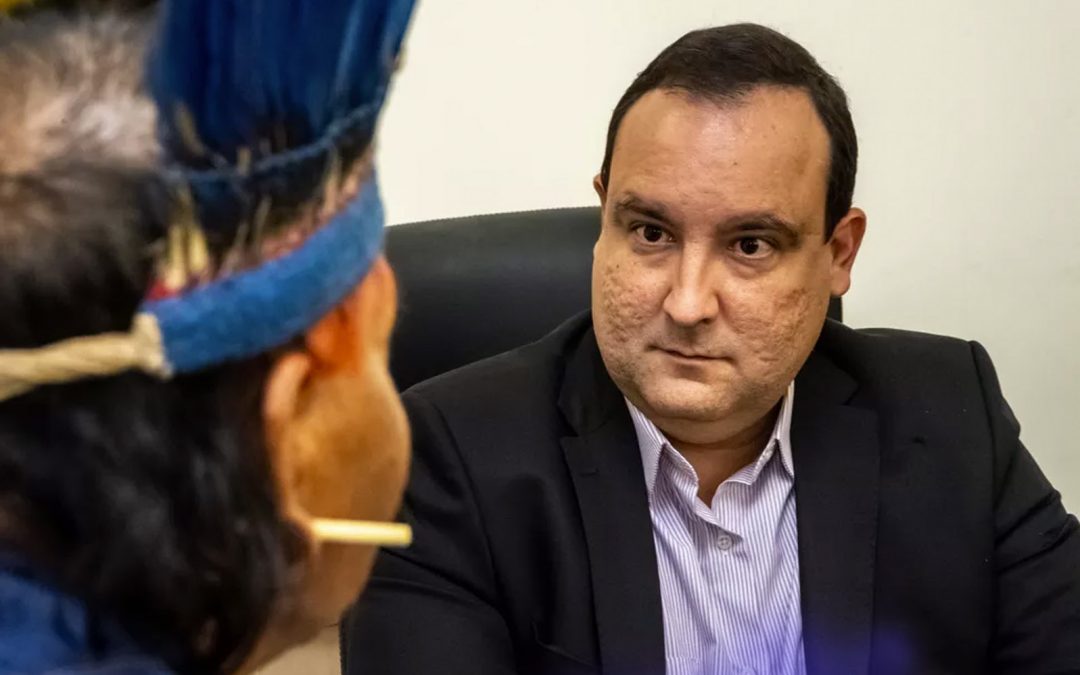
16/Jun/2021
(FUNAI is the National Foundation responsible for developing public policies regarding indigenous peoples and territories. This institution should provide the appropriate conditions for a peaceful and fulfilling life for brazilian indigenous people, including safety and protection against any threat or violence)
We, indigenous peoples gathered at the Rise for the Earth Camp, in Brasília, have been mobilized for more than 10 days against the anti-indigenous agenda that is currently under appreciation by the Executive, Legislative and Judiciary Powers. This agenda includes legal innovations that put all indigenous lives at risk.
Still under the restrictions of the pandemic, with most of us vaccinated – vaccination that only happened due to a lot of struggle from the indigenous movement, we brought together more than 1,000 indigenous people from all regions of Brazil to state: the police chief Marcelo Xavier is no longer the president for FUNAI!
This is the worst term in the Foundation’s history, which failed to fulfill the function of protecting and promoting the rights of indigenous peoples, in order to negotiate our lives and use them for the benefit of shady and private interests from agribusiness, illegal mining and so many other threats that put our existence at risk.
A police chief who has turned Funai into the “Foundation for the Indigenous People Intimidation”, an institution that is currently closer to a political police service, that persecutes and criminalizes indigeneous leaderships. It institutes anti-indigenous administrative acts, such as Normative Instruction No. 09 and others; negotiates measures in the National Congress, such as the position he expressed in favor of indigenous peoples’ enemies before the National Assembly Commission for the Constitution and Justice (CCJ), bizarrely asking for the approval of 490 bill.
In practice, this bill terminates the policy of demarcating indigenous lands in the country, and still opens up the possibility of revising previously demarcated lands.
Enough of nonsense!
Dump Marcelo Xavier!
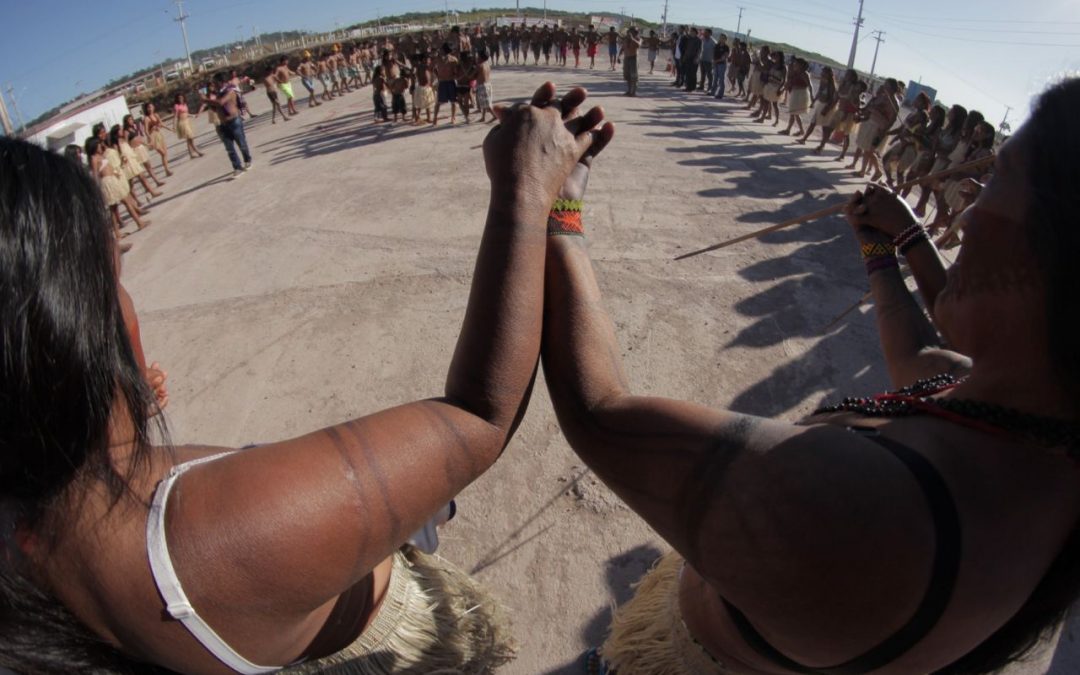
28/May/2021
All our Munduruku people are outraged with the cancellation of the Federal Police operation in our region. The operation cannot end now, when the invaders are attacking the leaders. We are unable to understand how the operation leaves our territory at this moment of so much danger to us. We’re screaming for help!
We demand that this operation against illegal mining be continued and that the security forces return to expel all the miners that are still within our area and ensure the safety of our people. The mines have not been closed and our villages and leaders continue to be attacked and threatened. On the 26th May, Fazenda Tapajós village was invaded by these criminals with gunshots and the houses were set on fire.
Other villages and leaders are being threatened. If they do not arrest who is threatening us, we will die and it will be the fault of the federal government and everyone who encouraged the violence. We are dying poisoned by mercury and in danger of being murdered by the miners.
The miners protested and attacked the National Security Forces and after that the operation was withdrawn, leaving our region. The operation that was supposed to end illegal mining ended up obeying the invaders who work illegally and stopped the police operation. In the meantime, we leaders who protect our territory are living in constant fear that the worst will happen. We no longer have peace for our families within our own land and in our homes.
With the operation stalled and the security forces that promised to protect us have left, we are now left on our own in the middle of the conflict. The pariwat (white people) continue to set us against each other, without respecting our territory, our culture, our life and the future of our children. The government once again makes a premeditated move to kill us in our own land. A farce announced to protect criminals, which did not close mines within Munduruku Indigenous Land and did not manage to contain and prevent the attack on our leaderships, leaving the territory after being pressured by criminals, legitimizing all these illegal practices and giving strength to the invaders. We no longer want this type of inefficient operation, which leaves us even more unprotected. We want the lasting and effective presence of the State, fulfilling its constitutional duty to protect indigenous lands, complying with court decisions and the recommendations of the MPF to remove illegal mining from our lands and protect the lives of our people.










